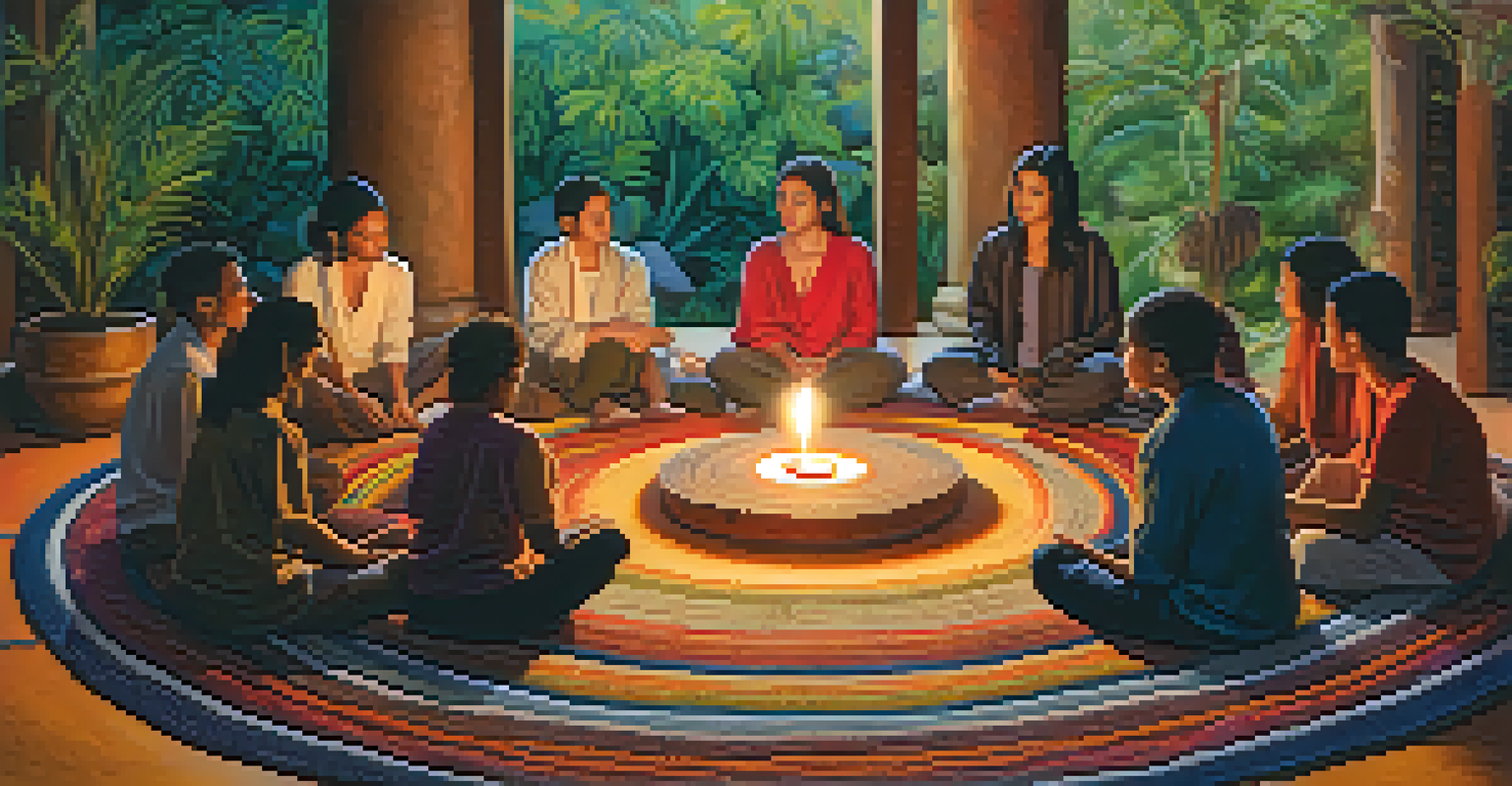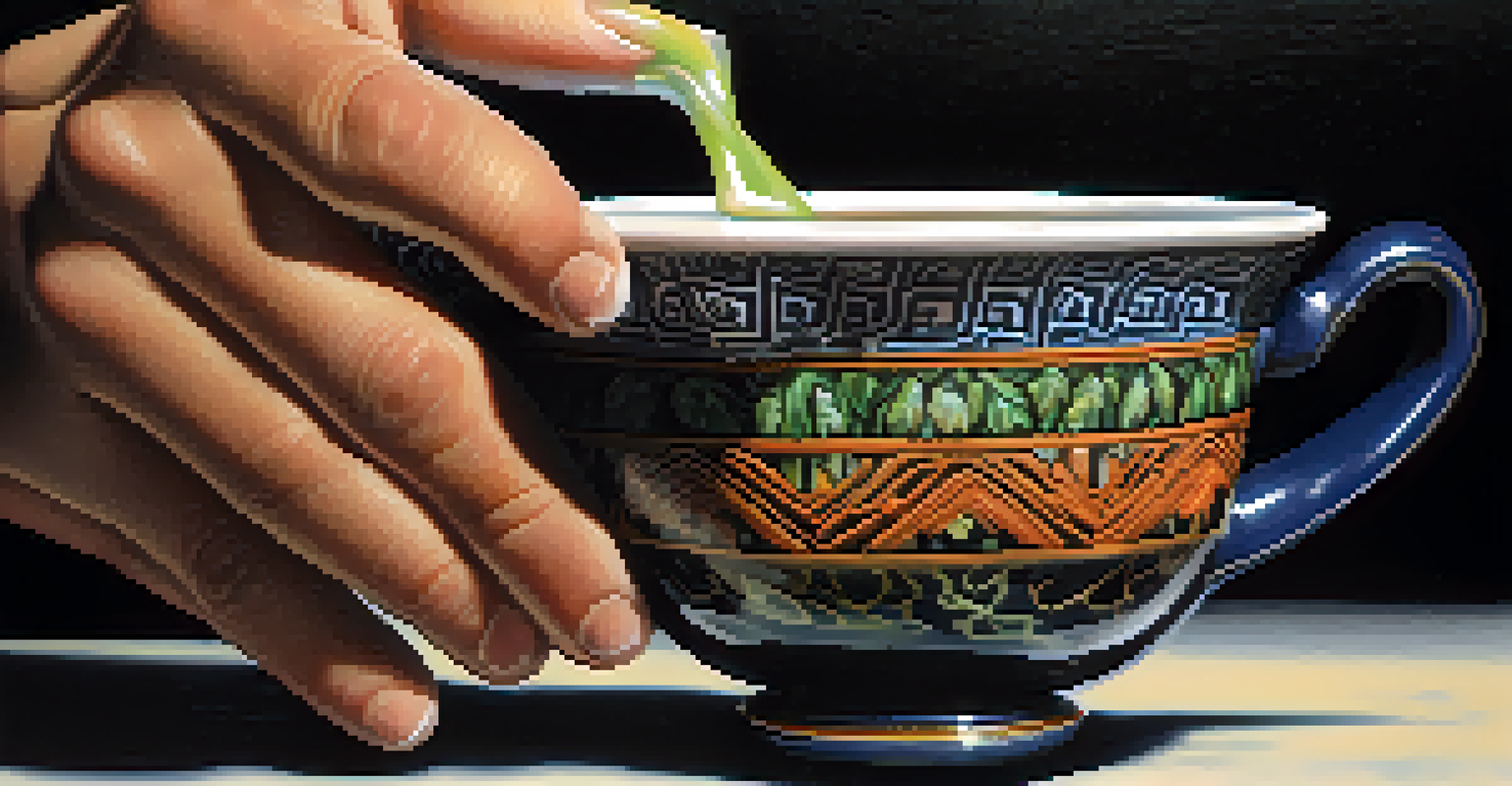Understanding the Link Between Ayahuasca and Spiritual Bypassing

What is Ayahuasca and Its Uses in Spiritual Practices?
Ayahuasca is a powerful plant medicine traditionally used by indigenous cultures in the Amazon. It's made from the Banisteriopsis caapi vine and the Psychotria viridis leaf, creating a potent brew that induces altered states of consciousness. Many people seek ayahuasca for healing, self-discovery, and spiritual awakening, often attending ceremonies led by experienced shamans.
The wound is the place where the Light enters you.
The experience of consuming ayahuasca can lead to profound insights, emotional releases, and a sense of connection to something greater than oneself. Participants often describe it as a journey into their inner worlds, revealing deep truths and unaddressed traumas. This makes ayahuasca appealing for those looking to enhance their spiritual growth or heal emotional wounds.
However, it's crucial to approach ayahuasca with respect and caution, as the experience can be intense and should not be taken lightly. Proper guidance and preparation are essential to navigate the journey safely and effectively, ensuring that participants are ready to face the challenges that may arise.
Defining Spiritual Bypassing and Its Implications
Spiritual bypassing refers to the tendency to use spiritual practices or beliefs to avoid dealing with painful emotions, unresolved issues, or psychological wounds. This can manifest in various ways, such as dismissing legitimate feelings or using spirituality as a shield against life's challenges. While spiritual practices can be incredibly beneficial, they can also become a way to escape reality.

For instance, someone might attend yoga classes or meditation retreats, believing they are 'working on themselves,' yet avoid confronting deeper emotional scars. This can prevent genuine healing and growth, leading to a superficial understanding of spirituality. In essence, spiritual bypassing can create a false sense of enlightenment while neglecting the underlying issues that need attention.
Ayahuasca for Healing and Growth
Ayahuasca serves as a powerful tool for emotional healing and spiritual awakening, but it requires respectful and intentional use.
Recognizing spiritual bypassing is crucial for anyone on a personal growth journey. Awareness allows individuals to address their emotional challenges authentically, rather than glossing over them with spiritual platitudes or practices. By confronting these issues head-on, one can achieve true healing and a more profound spiritual connection.
The Intersection of Ayahuasca and Spiritual Bypassing
At first glance, ayahuasca may seem like an antidote to spiritual bypassing, offering a path to deep emotional and spiritual healing. However, it can also inadvertently contribute to bypassing if individuals use the experience solely as an escape. This highlights the importance of intention when participating in ayahuasca ceremonies; the focus should be on genuine self-exploration and healing rather than seeking a quick fix.
Healing takes time, and asking for help is a courageous step.
For example, some individuals may seek out ayahuasca to avoid confronting painful realities in their lives. They might hope that the experience will magically resolve their issues without the hard work of introspection and emotional processing. This illustrates how the allure of ayahuasca can sometimes lead to a bypassing attitude, undermining the potential benefits of the experience.
A balanced approach is essential for those considering ayahuasca as a tool for spiritual growth. It's vital to prepare mentally and emotionally, understanding that the journey may unveil difficult truths that require further work. Engaging in supportive practices, such as therapy or community support, can help individuals integrate their experiences and avoid falling into the trap of spiritual bypassing.
Recognizing Signs of Spiritual Bypassing After Ayahuasca
After an ayahuasca ceremony, it's important to be mindful of any tendencies toward spiritual bypassing. One key sign is the tendency to dismiss ongoing emotional pain or unresolved issues, thinking that the ayahuasca experience has 'fixed' everything. This can manifest in a belief that one should be 'over' their problems simply because they have had a profound experience.
Another indicator is the use of spiritual jargon or platitudes to avoid deeper emotional work. For instance, someone might proclaim that 'everything happens for a reason' without addressing their feelings of grief or loss. This can create a disconnect between their spiritual insights and their emotional reality, leading to further avoidance rather than healing.
Beware of Spiritual Bypassing
Spiritual bypassing can occur when individuals use ayahuasca experiences to escape deeper emotional work instead of confronting their issues.
Recognizing these signs can empower individuals to take a more holistic approach to their healing journey. It encourages them to integrate the insights gained from ayahuasca while also committing to ongoing emotional work. This integration is crucial for achieving lasting transformation and preventing the pitfalls of spiritual bypassing.
The Role of Integration After Ayahuasca Experiences
Integration is the process of making sense of and incorporating the insights gained during an ayahuasca journey into everyday life. This step is often overlooked but is crucial for ensuring that the experience leads to genuine growth and healing. Without proper integration, individuals may find themselves reverting to old patterns or coping mechanisms, which can lead to spiritual bypassing.
Effective integration can involve journaling, therapy, or participating in integration circles where individuals share their experiences and insights with others. These practices help individuals process their feelings and understand how to apply the lessons learned during their ayahuasca experience. By doing this, they can bridge the gap between the spiritual and the practical, creating lasting change.
Ultimately, integration allows for a deeper connection to oneself and one's emotions, fostering a more authentic spiritual journey. It encourages individuals to face their challenges directly, rather than avoiding them, leading to true healing and personal growth.
Finding Healthy Spiritual Practices Post-Ayahuasca
After an ayahuasca experience, it’s essential to engage in healthy spiritual practices that support ongoing growth without leading to bypassing. Mindfulness, meditation, and grounding exercises can help individuals stay connected to their emotions and experiences. These practices encourage a deeper self-awareness and help individuals process their feelings in a constructive manner.
Additionally, seeking out supportive communities can provide a safe space for sharing experiences and learning from others. Engaging in discussions about spiritual bypassing and emotional challenges can foster a sense of belonging and understanding. This communal aspect can be incredibly healing, allowing individuals to feel less isolated in their journeys.
Importance of Integration Practices
Integrating insights gained from ayahuasca is crucial for lasting change, encouraging ongoing emotional processing and personal growth.
Finally, it's important to remain open to feedback and self-reflection. This willingness to explore one's own motivations and feelings can create a richer, more authentic spiritual practice. By prioritizing honest self-exploration, individuals can continue to grow and heal in meaningful ways.
Embracing Authentic Spiritual Growth Beyond Ayahuasca
True spiritual growth requires a commitment to authenticity and emotional honesty. While ayahuasca can be a powerful catalyst for change, it’s the ongoing work that truly fosters transformation. Embracing the messiness of emotions, facing fears, and acknowledging unresolved issues is where real growth happens.
Individuals can cultivate a holistic spiritual practice by integrating lessons from ayahuasca with other healing modalities. This may include therapy, creative expression, or holistic health practices. By diversifying their approach, they can prevent spiritual bypassing and create a more balanced life.

Ultimately, the goal is to develop a resilient and grounded spiritual path that honors both the highs and lows of the human experience. By committing to this authentic journey, individuals can achieve deeper connections with themselves and others, leading to a more fulfilling and meaningful life.